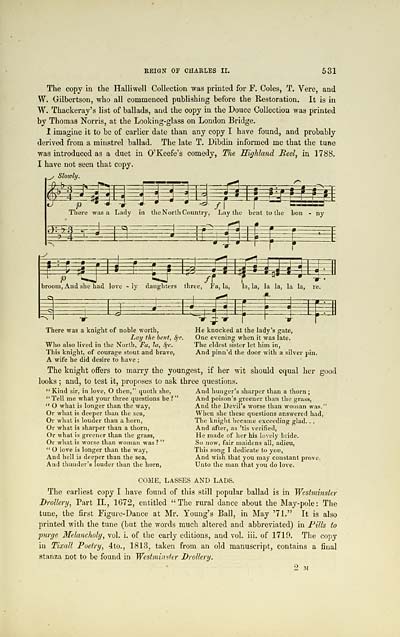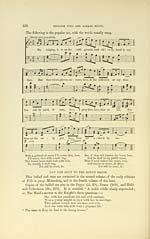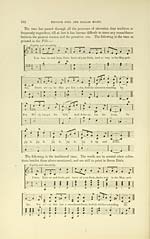Glen Collection of printed music > Printed text > Popular music of the olden time > Volume 2
(155) Page 531 - Come, lasses and lads
Download files
Complete book:
Individual page:
Thumbnail gallery: Grid view | List view

REIGN OF CHARLES II.
531
The copy in the Halliwell Collection was printed for F. Coles, T. Vere, and
W. GHlbertson, who all commenced publishing before the Restoration. It is in
W. Thackeray's list of ballads, and the copy in the Douce Collection was printed
by Thomas Norris, at the Looking-glass on London Bridge.
I imagine it to be of earlier date than any copy I have found, and probably
derived from a minstrel ballad. The late T. Dibdin informed me that the tune
was introduced as a duet in O'Keefe's comedy, The Highland Reel, in 1788.
I have not seen that copy.
_y Slowly.
i
^
There was a Lady in the North Country, Lay the bent to the bon - ny
msE
mi
3H
h±z
||f^=p^k^
3E
broom, And she had love - ly
7f
daughters three, Fa, la.
la, la, la la, la la, re.
j u-^j q
$^s
^
^=
*?
There was a knight of noble worth,
Lay the bent, fyc.
Who also lived in the North, Fa, la, S[C.
This knight, of courage stout and brave,
A wife he did desire to have ;
He knocked at the lady's gate,
One evening when it was late.
The eldest sister let him in,
And pinn'd the door with a silver pin.
The knight offers to marry the youngest, if her wit should equal her good
looks ; and, to test it, proposes to ask three questions.
" Kind sir, in love, O then," quoth she,
" Tell me what your three questions be ? "
" O what is longer than the way,
Or what is deeper than the sea,
Or what is louder than a horn,
Or what is sharper than a thorn,
Or what is greener than the grass,
Or what is worse than woman was ? "
" O love is longer than the way,
And hell is deeper than the sea,
And thunder's louder than the horn,
And hunger's sharper than a thorn ;
And poison's greener than the grass,
And the Devil's worse than woman was."
When she these questions answered had,
The knight became exceeding glad. . .
And after, as 'tis verified,
He made of her his lovely bvide.
So now, fair maidens all, adieu,
This song I dedicate to you,
And wish that you may constant prove.
Unto the man that you do love.
COME, LASSES AND LADS.
The earliest copy I have found of this still popular ballad is in Westminster
Drollery, Part LT., 1672, entitled "The rural dance about the May-pole: The
tune, the first Figure-Dance at Mr. Young's Ball, in May '71." It is also
printed with the tune (but the words much altered and abbreviated) in Pills to
purge Melancholy, vol. i. of the early editions, and vol. iii. of 1719. The copy
in Tixall Poetry, 4to., 1813, taken from an old manuscript, contains a final
stanza not to be found in Westminster Drollery.
2 M
531
The copy in the Halliwell Collection was printed for F. Coles, T. Vere, and
W. GHlbertson, who all commenced publishing before the Restoration. It is in
W. Thackeray's list of ballads, and the copy in the Douce Collection was printed
by Thomas Norris, at the Looking-glass on London Bridge.
I imagine it to be of earlier date than any copy I have found, and probably
derived from a minstrel ballad. The late T. Dibdin informed me that the tune
was introduced as a duet in O'Keefe's comedy, The Highland Reel, in 1788.
I have not seen that copy.
_y Slowly.
i
^
There was a Lady in the North Country, Lay the bent to the bon - ny
msE
mi
3H
h±z
||f^=p^k^
3E
broom, And she had love - ly
7f
daughters three, Fa, la.
la, la, la la, la la, re.
j u-^j q
$^s
^
^=
*?
There was a knight of noble worth,
Lay the bent, fyc.
Who also lived in the North, Fa, la, S[C.
This knight, of courage stout and brave,
A wife he did desire to have ;
He knocked at the lady's gate,
One evening when it was late.
The eldest sister let him in,
And pinn'd the door with a silver pin.
The knight offers to marry the youngest, if her wit should equal her good
looks ; and, to test it, proposes to ask three questions.
" Kind sir, in love, O then," quoth she,
" Tell me what your three questions be ? "
" O what is longer than the way,
Or what is deeper than the sea,
Or what is louder than a horn,
Or what is sharper than a thorn,
Or what is greener than the grass,
Or what is worse than woman was ? "
" O love is longer than the way,
And hell is deeper than the sea,
And thunder's louder than the horn,
And hunger's sharper than a thorn ;
And poison's greener than the grass,
And the Devil's worse than woman was."
When she these questions answered had,
The knight became exceeding glad. . .
And after, as 'tis verified,
He made of her his lovely bvide.
So now, fair maidens all, adieu,
This song I dedicate to you,
And wish that you may constant prove.
Unto the man that you do love.
COME, LASSES AND LADS.
The earliest copy I have found of this still popular ballad is in Westminster
Drollery, Part LT., 1672, entitled "The rural dance about the May-pole: The
tune, the first Figure-Dance at Mr. Young's Ball, in May '71." It is also
printed with the tune (but the words much altered and abbreviated) in Pills to
purge Melancholy, vol. i. of the early editions, and vol. iii. of 1719. The copy
in Tixall Poetry, 4to., 1813, taken from an old manuscript, contains a final
stanza not to be found in Westminster Drollery.
2 M
Set display mode to: Large image | Transcription
Images and transcriptions on this page, including medium image downloads, may be used under the Creative Commons Attribution 4.0 International Licence unless otherwise stated. ![]()
| Special collections of printed music > Glen Collection of printed music > Printed text > Popular music of the olden time > Volume 2 > (155) Page 531 - Come, lasses and lads |
|---|
| Permanent URL | https://digital.nls.uk/91363854 |
|---|
| Shelfmark | Glen.254a |
|---|---|
| Additional NLS resources: | |
| Attribution and copyright: |
|
| Description | Scottish songs and music of the 18th and early 19th centuries, including music for the Highland bagpipe. These are selected items from the collection of John Glen (1833 to 1904). Also includes a few manuscripts, some treatises, and other books on the subject. |
|---|
| Description | The Glen Collection and the Inglis Collection represent mainly 18th and 19th century Scottish music, including Scottish songs. The collections of Berlioz and Verdi collected by bibliographer Cecil Hopkinson contain contemporary and later editions of the works of the two composers Berlioz and Verdi. |
|---|

